I concluded a recent post saying if anyone ever asks you how many gun owners there are in America, you can tell them AT LEAST: 40% of households in America have guns in them and 30% of individuals in America personally own a gun.
Saying AT LEAST is crucial here, because these figures underestimate the actual rate of gun ownership in the United States. How badly they underestimate gun ownership we do not and cannot know precisely. My educated guess is that the underestimate is at least 10%, that 25% would not be an unreasonable amount, and more than 25% is likely.
So, if anyone ever asks you how many gun owners there are in America, you can tell them, No one really knows but PROBABLY:
44 to 50% of households (or more) in American have guns in them
33 to 37% of individuals (or more) in America own a gun
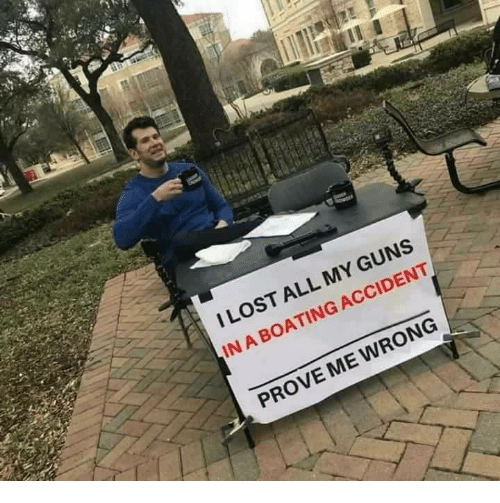
It is not easy to explain simply why surveys underestimate gun ownership rates, but I will try. We basically need to understand why people who own or live with guns don’t end up in the “YES” column when surveys ask “Do you own a gun?” or “Do you have a gun in your home?”
Following are some major reasons I can think of. Can you document others?
1) Systematic Non-Response
We have good reason to believe that in some surveys people who REFUSE to answer a gun ownership question or say they DON’T KNOW actually own guns but think it is none of the questioner’s business, or “nunya” as we say in the South.
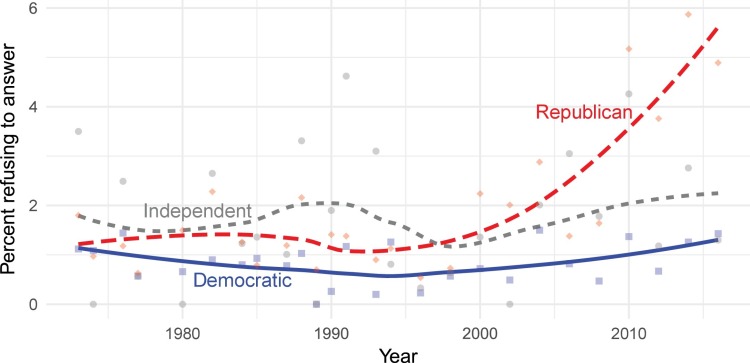
Iowa State University political scientist Robert Urbatsch argues this at length in a recently published article in The Social Science Journal about General Social Survey (GSS) data (which has the lowest estimates of personal and household gun ownership among major surveys). The percentage of respondents who have refused to answer the GSS gun ownership question has increased in recent years. This is true among people of all political stripes, but is especially so among Republicans, those most likely to actually own guns.
Similarly, the Monmouth University Poll, which produces higher estimates of gun ownership than the GSS, reports that 7% of respondents answered “Don’t know” to a combined personal/household gun ownership question. Some part of these “Don’t knows” probably DO know there are guns in their household and simply do not want to say so.
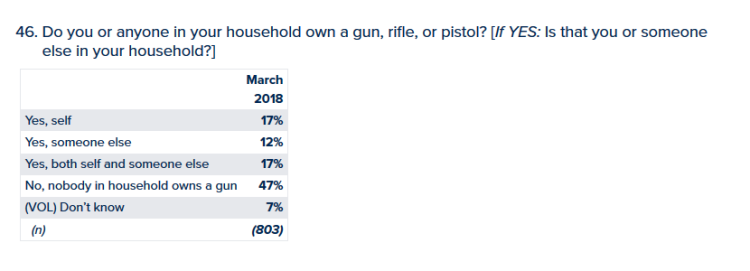
In a 2015 online poll of likely voters, Zogby Analytics took up this issue directly asking: “If a national pollster asked you if you owned a firearm, would you determine to tell him or her the truth or would you feel it was none of their business?”
Zogby reports that 36% of respondents said it is none of the pollster’s business. This includes 35% of current gun owners (do they not consider Zogby a national pollster?), 38% of former gun owners (“lost in boating accident”), and even 29% of people who have never owned guns (“Meeeeee? Own guuuuuuuns? Neeeeeever!”).
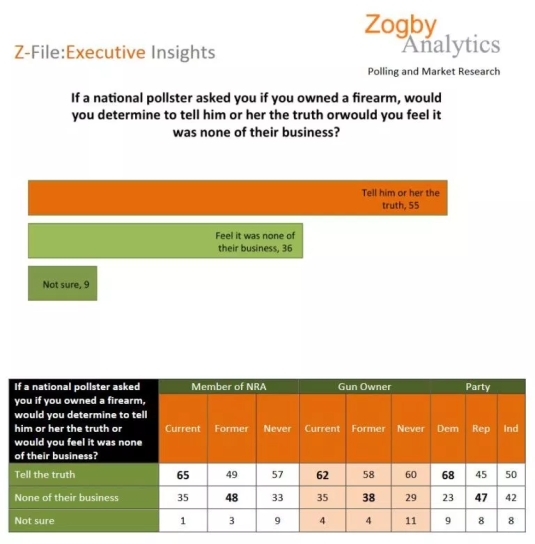
2) False Negatives
Respondents who do not want to tell interviewers that they actually own guns do not have to refuse to answer or claim ignorance. They can also simply deny gun ownership by answering “No.” I call these false negatives. (Like you are actually pregnant but the pregnancy test say you aren’t.)
A) Lost in Boating Accident
A common — all too common, at times — joking response among some gun owners when the question of how many guns they own comes up in conversation is, “None, they were all lost in a boating accident.” The gunternet is full of this meme.
But notice the trend in positive responses to the gun in home question on the Gallup Poll (below). Through the 1980s and into the 1990s we see a rise in the percentage of people who said they have guns in their home (coinciding with the Reagan/Bush years) and a precipitous decline in positive responses from 1994 to 1999, the years of the Clinton presidency from the passage of the “assault weapon” ban through the year of the Columbine HS massacre.
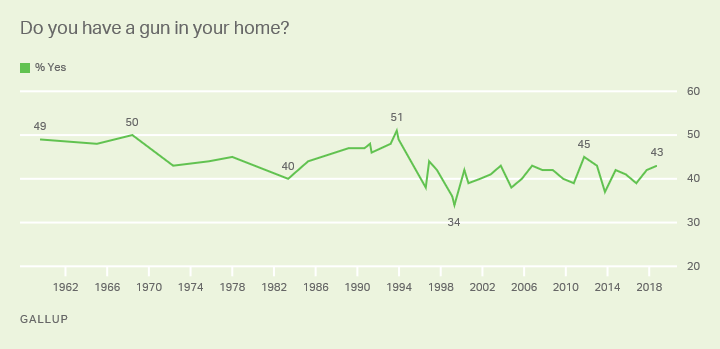
In times when and places where the government is threatening to enact gun control up to and including banning weapons, there is a strong disincentive for some people to admit to owning guns in a survey.
B) Gender and Underreporting
It has long been known that female survey respondents underreport household gun ownership relative to male respondents by 7 to 12%. This could be due to genuine ignorance (I legitimately do not know if my spouse has a gun in our house) or false reporting due to social desirability bias (women are less pro-gun than men).
C) Race and Underreporting
I recently spoke to another sociologist who studies urban African American communities. No friend of guns herself, she tells me the people in those communities are extremely wary of people knowing they have firearms, given the racist denial of African American gun rights throughout American history (see works by law professors Nicholas Johnson and Adam Winkler). Cities with the most restrictive gun laws also often have high concentrations of African American residents (think of Supreme Court decisions in Heller vs. District of Columbia and McDonald vs. Chicago).
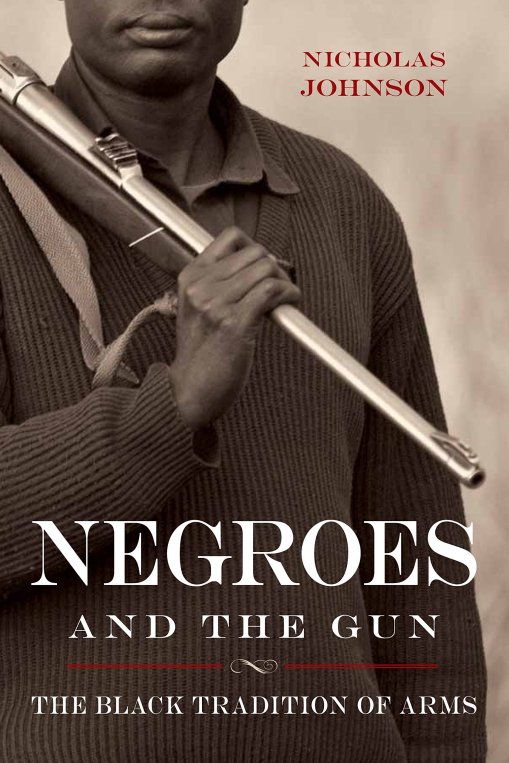
D) Prohibited Persons and Underreporting
Although the social worlds of those who own guns legally and those who own them illegally are dramatically different, if we actually want to know what percentage of people own guns, we ought to include those who own them illegally. But illegal gun owners have a strong incentive to lie on a survey (if they even end up in the final sample, which is another issue altogether).
It is against the law for felons to possess firearms (unless they have had their rights restored) directly or even indirectly by living in a household in which they have the opportunity to possess another household member’s firearm. Why would a prohibited person admit in a survey to personally owning a firearm or having one in their household? Surely some would, but I suspect many would not.
Our longstanding “war on drugs/crime” and the trend in America toward mass incarceration is a recipe for ever more underreporting of gun ownership. One recent study finds that 8% of the U.S. adult population had received a felony conviction in 2010, including 13% of all adult males and 33% of African-American men (up from 5.25% and 13.3%, respectively, in 1980).
But being legally prohibited from possessing a firearm does not mean you will not own a gun if you believe your life depends on it. As many others have, the Urban Institute recently found young adult men in Chicago “carry guns to stay safe,” whether they are legally permitted to or not (most are not).
I heard this also in a symposium I attended at Winston-Salem State University early in my research on gun culture. In the Q&A, one man talked about how when he was “young and stupid” he committed a felony and lost his gun rights, but he had been “on the straight and narrow” for some time now. He wanted to know how he could get his gun rights restored so he could protect himself and his family. Another audience member asked whether she could be charged for using a firearm she might carry illegally if she had a legitimate need to use it in self-defense. I wonder whether there would be a gap between reality and self-report if these two individuals were part of a gun ownership survey sample.
But What About False Positives?
It is possible that some of this underestimation of gun ownership rates is canceled out by individuals who do not own guns but claim on surveys that they do. I call these false positives. (Like you are not actually pregnant but the pregnancy test says you are.)
I do not find as many convincing arguments for false positives as for false negatives, but a discussion partner on Twitter, @BruceHallman, suggests: “Some feel gun owning is a stigma. Others feel gun owning is emblematic of virtue and honor.” The latter could falsely report owning guns, a sort of gun ownership version of stolen valor.
I am not fully convinced by Hallman’s argument, but I am interested in hearing other theories or data on false positive in gun ownership reporting. Let me have them!
I even lost my boat….
LikeLike
In a gun accident?
LikeLiked by 1 person
My curiosity leads me to ask why do they want to know. I would want to know who’s asking and for what purpose before I would answer any pollsters questions. But that’s just me.
LikeLike
I think that is a good question to ask. I answer some surveys – usually the academic ones- and not others- marketing and political.
LikeLike
I have created surveys but do not use telephone to reach people. For myself an others that I know we do not answer phone surveys and may (only may) answer mailed surveys. I would never tell anyone on the phone that I owned a gun because it is too easy to fake whom they maybe.
LikeLike